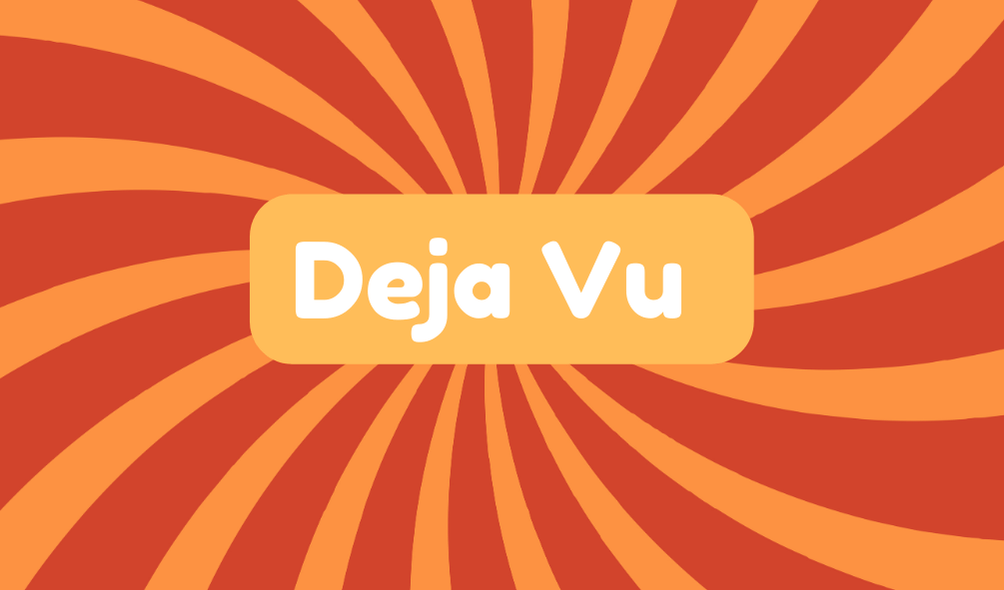Déjà vu refers to the unsettling feeling of familiarity with a current experience. The term, rooted in the French phrase meaning "already seen," suggests a misfiring in memory processing. Common examples include walking into a café and feeling as if one has been there before. This phenomenon has historical and cultural significance, impacting literature and art. With ongoing research exploring its complexities, one can uncover more about how this intriguing sensation relates to human perception and memory.
Synonyms
Déjà vu is a fascinating phenomenon that often leaves individuals pondering the nature of their experiences. The sensation can spark curiosity about its synonyms, which capture its essence of intense familiarity. Recognizing equivalent terms can deepen understanding of this complex experience. Consider these key synonyms:
- Familiarity: The state of being well-acquainted with something.
- Recognition: The acknowledgment of something previously encountered.
- Recollection: The act of recalling past events or emotions.
- Nostalgia: A sentimental longing for memorable moments.
While these terms share similarities, they may not fully encapsulate the unique sensation of déjà vu.
Example of Sentences
Experiencing a moment that feels strikingly familiar can often lead individuals to question the nature of their memories. Déjà vu, an intriguing memory phenomenon, surfaces in various forms. Here are some illustrative sentences showcasing these uncommon experiences:
- While strolling through the park, he suddenly felt a peculiar sense of déjà vu.
- As she picked up the book, a wave of familiarity washed over her.
- Attending the reunion sparked an odd sense of having been there before.
- The moment he entered the café, déjà vu enveloped him, blurring past and present.
These instances highlight how memory intertwines with everyday life, leaving one pondering reality.
Origin
The phenomenon of déjà vu presents a fascinating intersection of language and psychology, originating from the French phrase "déjà vu," which translates to "already seen." This term encapsulates the perplexing experience where individuals feel an uncanny familiarity with current surroundings or events, as if they have encountered them before. Neuroscience implications suggest that memory processes in the brain underlie this sensation, revealing potential misfirings in recalling past experiences. Cultural variations in experiencing déjà vu further enrich this topic, implying diverse interpretations and significance across societies. Understanding its origin invites both curiosity and skepticism about the complexities of human perception and memory.
Collocations
Collocations related to déjà vu highlight how language reflects the intriguing nature of this psychological phenomenon. By examining these phrases, individuals can better understand the connections between language and the feelings of familiarity associated with déjà vu experiences. Some notable collocations include:
- Intense déjà vu
- Déjà vu sensations
- Familiar déjà vu
- Déjà vu moments
These expressions suggest varying psychological interpretations of déjà vu, emphasizing its complexity. Such collocations help frame discussions that challenge common perceptions, inviting curiosity while underscoring the nuanced interactions between memory and reality. Consequently, they encourage a critical view of our understanding of these experiences.
How to Use in Everyday Language
Using the term "déjà vu" in everyday language can add depth to conversations, particularly when discussing feelings of familiarity or unexpected recognition. This phenomenon often surfaces in daily encounters, prompting individuals to reflect on the cultural significance of their experiences. For instance, one might say, "Walking into this café feels like déjà vu," which can provoke thoughts about memory and perception. Employing the term not only highlights shared emotional responses but also fosters engaging discussions on how our brains process past experiences. However, it is important to remember that while intriguing, these sensations are often just fleeting mental glitches, not mystical events.
Why Is It Still Relevant Today?
Although many people might dismiss déjà vu as merely a curious anomaly of the mind, it continues to spark interest in both scientific and cultural discussions today. Its cultural significance is evident, as it appears in literature and art, often symbolizing nostalgia and existential questions. Psychologically, déjà vu offers insight into how memory and perception intersect, prompting researchers to explore its underlying mechanisms. This blend of intrigue and the quest for understanding keeps déjà vu relevant, as it challenges assumptions about human experience and cognition. Ultimately, it serves as a reminder of the complexities of the mind that remain to be fully grasped.







